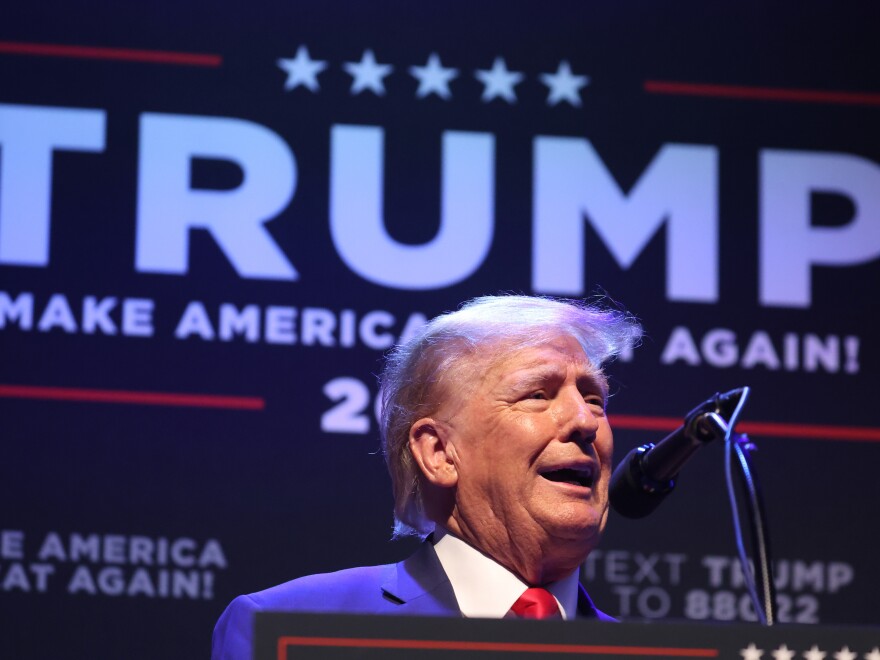Republican party leaders are split on whether the United States should continue to back Ukraine with billions of dollars of military equipment and aid, a rift that seems likely to become a major issue in the 2024 presidential election.
The latest sign of the GOP divide on Russia's war in Ukraine comes from Florida Gov. Ron DeSantis, who is seen as one of the top contenders in the Republican race to become the party's nominee.
DeSantis joined former President Donald Trump — another leading GOP contender — in opposing U.S. support for Ukraine. They outlined their positions in a survey of potential 2024 Republican candidates done by Fox News host Tucker Carlson.
"While the U.S. has many vital national interests — securing our borders, addressing the crisis of readiness within our military, achieving energy security and independence, and checking the economic, cultural, and military power of the Chinese Communist Party — becoming further entangled in a territorial dispute between Ukraine and Russia is not one of them," DeSantis said.

Biden has vowed support for 'as long as it takes'
Biden has been a staunch backer of Ukraine, vowing that the United States would stand by the country "as long it takes." The U.S. government has so far appropriated more than $112 billion in military and economic support for Ukraine.
But with little sign of an end to the conflict, polls show a growing number of Americans feel the United States is giving Ukraine too much.
DeSantis tapped into some of those concerns, telling Carlson that Biden has given Ukraine "virtual 'blank check' funding of the conflict for 'as long as it takes'" without defining objectives.
Trump also said opposing Russia is not in the U.S.'s strategic interest. "Our objective in Ukraine is to help and secure Europe, but Europe isn't helping itself," Trump wrote. "They are relying on the United States to largely do it for them. That is very unfair to us."

Other Republicans say Biden should provide more support to Ukraine
Other potential Republican candidates are on the opposite side of the rift.
Former Vice President Mike Pence said last month that the United States should increase its support.
"Make no mistake: This is not America's war. But if we falter in our commitment to providing the support to the people of Ukraine to defend their freedom, our sons and daughters may soon be called upon to defend ours," Pence said in a speech in Austin, Texas.
Former United Nations Ambassador Nikki Haley said the U.S. needs to help Ukraine prevent Russia from taking over. "If Russia wins, there is no reason to believe it will stop at Ukraine. And if Russia wins, then its closest allies, China and Iran, will become more aggressive," she said.

McConnell has tried to downplay the GOP split
Pence and Haley are more aligned with the views of Senate Republican Leader Mitch McConnell who has downplayed the split in his party.
"Reports about the death of Republican support for strong American leadership in the world have been greatly exaggerated," McConnell told European defense leaders last month in Munich. "My party's leaders overwhelmingly support a strong, involved America and a robust transatlantic alliance. Don't look at Twitter, look at people in power."
Republican House Speaker Kevin McCarthy has supported Ukraine, but more recently has warned that there "can't be a blank check" for Ukraine aid when the United States faces so much debt of its own.
Republican Sen. Marco Rubio, a senior member of the Senate Foreign Relations Committee who is also from Florida, was critical of DeSantis' comments. He told conservative radio talk show host Hugh Hewitt that DeSantis "doesn't deal with foreign policy every day as governor."
After DeSantis referred to the Ukraine war as a "territorial dispute," Rubio disagrees, telling Hugh Hewitt, "It’s not a territorial dispute in the sense that any more than it would be a territorial dispute if the U.S. decided it wanted to invade Canada or take over the Bahamas."
— Kaitlan Collins (@kaitlancollins) March 14, 2023
But among Republican supporters of Ukraine, there are also growing questions about the Biden administration's end game.
At a Capitol Hill hearing last month, Rep. Chris Stewart, R-Utah, pushed top Biden officials to explain the U.S. objectives in the war.
"When the president says we will support them for as long as it takes, my question is: as long as it takes to do what?" Stewart said. "We've got to define this. What does it mean to see this through? What does it mean to say we will be here until the end?"
Loading...
It's easier to tell U.S. voters that the money should be spent at home
Biden administration officials are not expected to ask Congress for more funding for Ukraine this fiscal year, which ends Sept. 30.
But future requests for funding could be complicated by the growing debate among Republicans over the war, especially as the 2024 race heats up.
Republican strategist Ryan Williams said making the case to American voters why fighting Russia is in U.S. interests is complicated. It's hard to explain the geopolitical impacts, and the importance of pushing back against dictators.
Williams said it's much easier to tell war-weary Americans that the U.S. is sending too much money overseas, especially when there are plenty of problems at home.
"It resonates," Williams said. "And I think that's why you're seeing more and more Republicans adopt that message, or at least tap the brakes on support for Ukraine, given where the base is heading."
Copyright 2025 NPR



